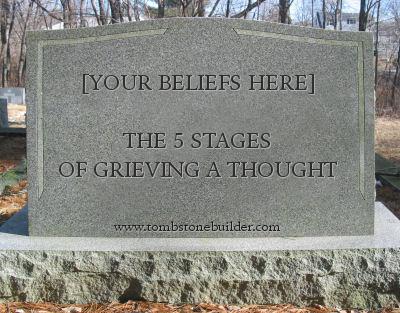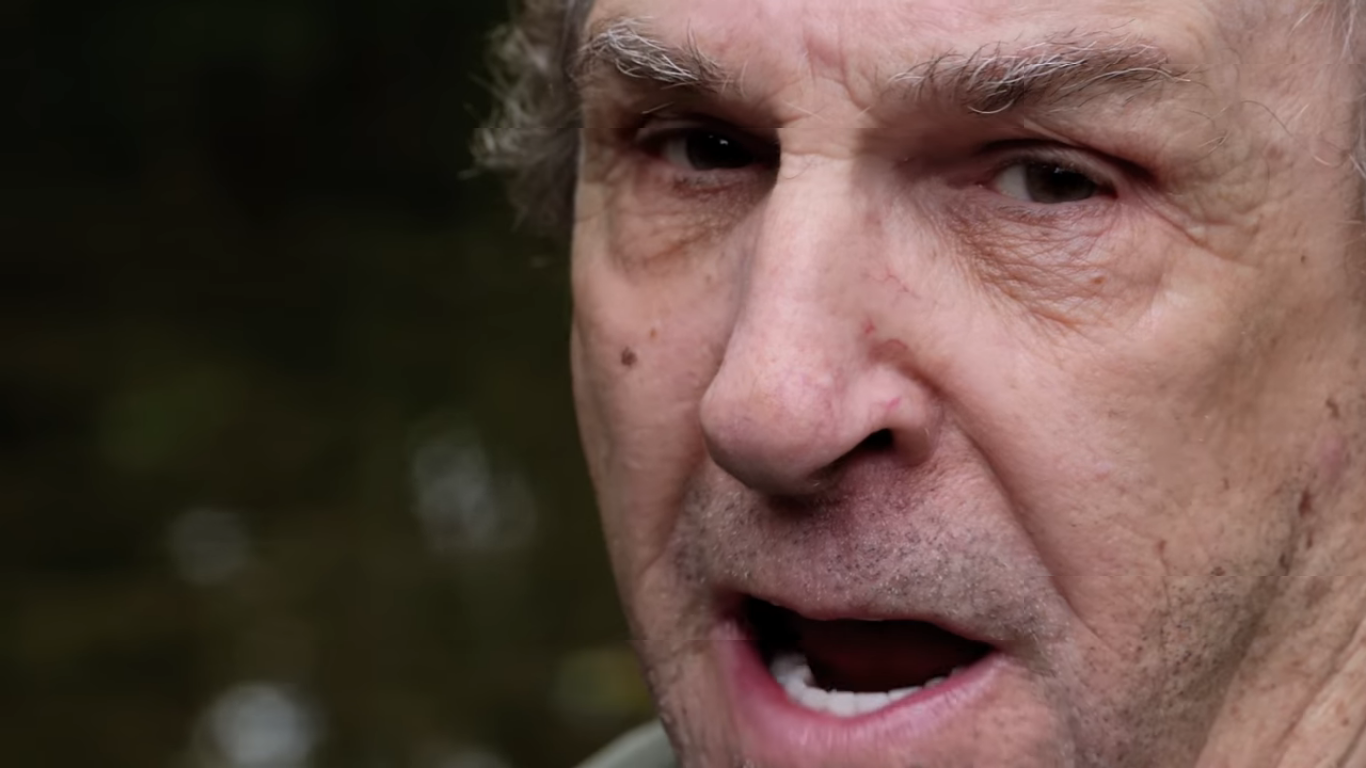
A belief is a valued thought which a person has invested energy into manifesting into existence. Many times in our lives, we develop beliefs which are incongruous with reality. Fundamental truths do not bend to our will, and thus we must choose to adapt or fight. Fighting a fundamental truth is fruitless, and can only result in misery until the fighter accepts defeat. Individuals always seek to distance themselves from negative emotions, so in cases where a truth can’t be avoided or resisted, the process of grieving is initiated to bring us into alignment with reality. This process was first described by Swiss psychiatrist Elizabeth Kübler-Ross in her 1969 book On Death and Dying. It’s important to note that the first four stages of this process may occur in any order. Stages might be skipped or repeated multiple times. The value in knowing this process is that each action betrays the internal environment of the grieving individual, and helps dictate how to best interact with them. Often the most difficult behaviors are manifested just before acceptance. A person dealing with a grieving individual should take each symptom as a sign of progress and express loving compassion and forgiveness at every stage in order to best support the person in their grief.

Image from gratisography.com
Denial
The first reaction is denial. In this stage, individuals believe a new idea is incorrect, and cling to falsehood. This occurs mostly due to the value placed on the contrary idea. This defense mechanism is essential in the cases when a person is correct. It is this same mechanism which encourages a person to express themselves in the first place. Conviction in an belief motivates our daily decisions and causes us to attempt to bring others into alignment with those beliefs.
Our subjective realities reinforce the idea that being wrong about an idea is shameful. Even If we’re taught not to be ashamed of our misconceptions, having wrong information causes wrong action, and though we may be forgiven by our loved ones, we’re still punished by reality. It’s easy to forgive the actions of others, but forgiving ourselves is much more difficult as a result. It often seems easier to double down on our incorrect behaviors and demand that the world change than to acknowledge our wrongness and adapt to conditions. This leads to the second stage of grief.

Screengrab from the music video for This River - JJ Grey and Mofro
Anger
When an individual recognizes that denial cannot continue, they become frustrated at who or what they perceive to be the source of the threat. Often increasing the strength of our convictions will cause opposition to back down. Once again, our subjective reality reinforces a negative reaction in response to the threat, at least in the short term. Unfortunately, even in cases where anger succeeds it only delays the resolution of a problem.
When defending an incorrect position, truth does not become a lie. It remains truth regardless of our convictions, and the difference between our comfortable lies and the inconvenient truth grows greater with time. Eventually, a resolution must be reached. Often those who hold differing beliefs will give up rather than dealing with an angry person. People who succeed in defending their misconceptions with anger often find themselves alone in the world, especially if they have little else to offer.

Image from pixabay.com by Gerd Altmann
Bargaining
The third stage involves the hope that the mistaken individual can avoid the full impact of their belief. To that end, they attempt to find a compromise or resolution which allows them to maintain some semblance of their valued position while also avoiding punishment. In cases where anger fails and the opposing position can be bargained with, this is often a successful technique. However, the end result is still an incorrect belief, accompanied by damage done to the self and the the relationships held with those entities which are aligned with truth. Eventually, bargaining must fail for the person to become open to a new perspective. Making concessions to individuals in this stage will often delay the next stage, and in the process might relieve some pressure from the situation. This may be useful in order to soften the impact of repeated psychic insult, but is ultimately a disservice to the person holding the incorrect position if they are allowed to continue in denial. The temptation to submit to bargaining must be refused before the next stage can be reached.

Image from gratisography.com
Depression
During this stage, the individual despairs at the recognition of their incorrect position. The cognitive gymnastics described up to this point are energy intensive to maintain. Once a truth is heard, it becomes nearly impossible to ignore. There is no logical way to dismantle it and render it harmless without incurring a significant neural load. Individuals who get stuck at the denial phase are able to do so because they develop logic structures to support their incorrect positions which are more complex than their ability to counter them. Those who become angry devote massive amounts of energy in order to diminish the problem in comparison. Bargaining is the result of the recognition that the individual’s beliefs might be incorrect, and thus signals the beginning of a collapse of internal resistance. This collapse manifests as a depressive episode. The internal barriers come down and the individual begins to suffer.
Suffering is caused by the recognition of a discrepancy between the reality of a situation and how the individual believes it should be. The individual will continue to suffer until they believe that they have been punished sufficiently for their mistaken beliefs. The amount of suffering is subjective, but it is most severe in those who have experienced a high degree of punishment in their previous experience. Suffering is a learned behavior which can be mitigated with practice and support. Externally this is reinforced by love and support from others, and internally though practice and forgiveness of the self.

Image from pixabay.com by Gerd Altmann
Acceptance
In this last stage, individuals embrace the truth or inevitability of the situation. In this stage the new truth replaces the old misconception and the individual has forgiven themselves for valuing a thought which isn’t in alignment with reality. They no longer have to fight to maintain the falsehood and thus present with a calmer, retrospective view. They reflect not only on their mistaken beliefs, but also on the behaviors which manifested out of these beliefs. They often express remorse for their previous actions, and may slip back into depression, but rarely revert to any of the earlier stages. Over time acceptance becomes not only easier to maintain, but the preferable state, and their convictions in their new beliefs become stronger. If a new situation arises which challenges their new belief, they will have the strength of their new knowledge, as well as the perspective of their previous belief, which will serve them as both parties enter the struggle once again. If the new belief is correct, they take on the role of the support person, while the other begins the grieving process. The perspective granted by previous experience can help with finding resolution compassionately, if that is the will of the participants.
Congratulations! This post has been upvoted from the communal account, @minnowsupport, by MrKMJ from the Minnow Support Project. It's a witness project run by aggroed, ausbitbank, teamsteem, theprophet0, someguy123, neoxian, followbtcnews, and netuoso. The goal is to help Steemit grow by supporting Minnows. Please find us at the Peace, Abundance, and Liberty Network (PALnet) Discord Channel. It's a completely public and open space to all members of the Steemit community who voluntarily choose to be there.
If you would like to delegate to the Minnow Support Project you can do so by clicking on the following links: 50SP, 100SP, 250SP, 500SP, 1000SP, 5000SP.
Be sure to leave at least 50SP undelegated on your account.
Downvoting a post can decrease pending rewards and make it less visible. Common reasons:
Submit
This is very helpful
Downvoting a post can decrease pending rewards and make it less visible. Common reasons:
Submit
Congratulations @mrkmj! You received a personal award!
Click here to view your Board
Do not miss the last post from @steemitboard:
Downvoting a post can decrease pending rewards and make it less visible. Common reasons:
Submit
Congratulations @mrkmj! You received a personal award!
You can view your badges on your Steem Board and compare to others on the Steem Ranking
Vote for @Steemitboard as a witness to get one more award and increased upvotes!
Downvoting a post can decrease pending rewards and make it less visible. Common reasons:
Submit